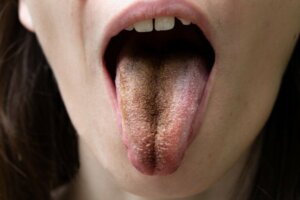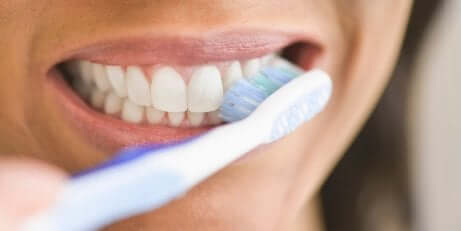Black Hairy Tongue: Causes, Symptoms and Tips

Black hairy tongue is one of those conditions that looks alarming, but isn’t actually a serious health problem. As the name implies, this disease is characterized by a dark spot on the tongue that looks like it has hair.
In reality, the black hairy tongue is a harmless and temporary condition. Normally, the only way to get rid of it is by fixing the factor that caused it. Often, that factor is related to oral hygiene. Usually, this condition isn’t painful, nor does it carry other symptoms.
What can cause black hairy tongue?
Generally speaking, black hairy tongue is caused by the overgrowth of bacteria in the mouth. This organ has numerous small bumps on its surface called papillae. Sometimes, dead skin cells can build up on them. When this happens, they become longer than usual and more easily trap bacteria, fungi, food and tobacco.
This accumulation can stain the papillae. As a result, it takes on the appearance of being black and hairy because of the dark tone and the optical illusion that it’s hairy.
This entire process can occur for various reasons. For example:
- Poor oral hygiene
- Taking antibiotics, which changes the composition of bacteria and yeast in the mouth
- Xerostomia or dry mouth
- Regular use of mouthwash that contains irritating or oxidizing agents
- Excessive alcohol, coffee or black tea consumption
- Smoking
- A soft diet that makes it difficult to exfoliate the dead cells on the tongue

Keep reading: Smoking Tobacco Damages the Oral Cavity
What are the symptoms?
The distinctive sign of black hairy tongue is the change in appearance of that organ. It takes on a dark color that can be black, brown, green, white, or tan.
In addition, it may also appear at first glance like your tongue is covered with hair. People with this condition often experience a metallic taste in their mouths, and they experience changes in taste. Also, they have bad breath and, if the problem is very severe, they may experience a tingling feeling.
Black hairy tongue isn’t a serious health problem, despite the alarming appearance of the tongue. However, if you’re concerned, it’s best to talk to your doctor.
It’s also worth seeing a doctor if the condition lasts for a long time, despite taking rigorous hygiene measures. In those cases, it’s best to make sure you aren’t dealing with another problem.
Read also: What Are Black Spots on the Tongue?
Treatment
Black hairy tongue doesn’t require medical treatment. Appropriate measures that you should take are improving your oral hygiene and eliminating any factors that could be causing the problem. For example, irritating mouthwashes or tobacco use.
However, if it’s not clear what’s happening or additional symptoms appear, you should see your doctor to confirm the diagnosis. It’s important to note that there are other factors that generate similar symptoms, such as:
- Some foods or medicines that stain the tongue
- It could be a symptom form a viral or fungal disease
- Injuries to the tongue that could change its appearance – in particular, hairy leukoplakia
- Products that contain bismuth may change its appearance, making it look similar to black hairy tongue
Tips to treat and prevent this condition at home

First, it’s best to identify the cause of your black hairy tongue. If you’re taking antibiotics, it’s logical to think that the problem will disappear a few days after you finish taking them.
It’s important to check the ingredients in your mouthwash. You may want to try one with a different formula. In any case, the important thing is to be more rigorous with your oral hygiene.
- Brushing your tongue: The taste of toothpaste may give the false impression that your tongue is clean, even if it isn’t. The best thing to do is brush your tongue softly, using a soft bristle toothbrush or a tongue scraper.
- Brush your teeth after eating: Ideally, use a fluoride toothpaste and brush your teeth after every meal or at least twice a day.
- Flossing: You should floss at least once a day since it helps to remove plaque and food debris that remain between your teeth.
- Visit the dentist: You should do this at least twice a year, or anytime you’re experiencing abnormalities.
Improving hygiene
If you notice you have a black hairy tongue, it’s best to improve your oral hygiene routines. You should brush your tongue twice a day. Then, once the problem disappears, you can cut it down to once a day.
Also, it may be a good idea to use a dental rinse made up of hydrogen peroxide and water. The contents should be one part peroxide to five parts water. Use this mixture twice a day and rinse it off with regular water.
All cited sources were thoroughly reviewed by our team to ensure their quality, reliability, currency, and validity. The bibliography of this article was considered reliable and of academic or scientific accuracy.
- EXPERTO, P. A. U. (2007). Tengo mal aliento: ¿a qué puede deberse?, ¿qué puedo hacer?, ¿qué me recomienda? Cient. dent, 4(1), 61-68.
- Villalobos, O. J., Salazar, C. R., & Ramírez de Sánchez, G. (2001). Efecto de un enjuague bucal compuesto de aloe vera en la placa bacteriana e inflamación gingival. Acta odontológica venezolana, 39(2), 16-24.
- Cardona-Hernández, M. Á., Padilla-Desgarennes, M. D. C., Fernández-Cuevas, L., Salazar-Villegas, K. N., & Landini-Enríquez, V. (2019). Lengua negra vellosa. Comunicación de un caso. Revista del Centro Dermatológico Pascua, 27(3), 92-95.
- Van der Waal, Isaäc. “Leucoplasia oral: una propuesta de simplificación y coherencia de la clasificación clínica y terminológica.” Medicina oral, patología oral y cirugía bucal. Ed. española 25.4 (2020): 228-232.
This text is provided for informational purposes only and does not replace consultation with a professional. If in doubt, consult your specialist.








